WINDHAM – A group of lawmakers toured the Maine Correctional Center on Friday to see how one of the state’s primary prisons functions and begin assessing the governor’s proposal to build a $100 million prison to replace it.
Gov. Paul LePage’s budget for the next two years includes a plan to build a prison on land near the current facility to house 1,000 or more inmates as a way of increasing efficiency.
All but the newest parts of the existing complex would be demolished.
Critics of the proposal, which is still in its infancy, say the state can ill afford to build a prison when many programs are being cut.
“Schools are old and inefficient also,” said Stan Gerzofsky, D-Brunswick, the Senate chairman of the Legislature’s Criminal Justice Committee, which toured the prison.
“Put your money in early education, you don’t need to build cells at the other end. … It’s about balance and priorities.”
Friday’s tour was scheduled before the governor’s proposal for a new prison was announced last week, and legislators are touring other correctional facilities throughout the state.
The Maine Correctional Center, overlooking River Road in Windham, is a sprawling complex of more than a dozen buildings constructed as long ago as 1920 and as recently as 2002. Designed to hold as many as 685 prisoners, it now houses roughly 622, including 92 women.
Its annual operating budget is $22 million, not including medical expenses and substance abuse programming. It does include salaries for 249 staff members, 171 of whom provide security. Salaries account for 86 percent of the budget.
Corrections is the largest portion of the state budget that’s within the Criminal Justice Committee’s jurisdiction.
Nine legislators, accompanied by an equal number of corrections staff and administrators, wound through the prison’s labyrinth of buildings, which house minimum- and medium-security prisoners.
The tour showed that the prison in Windham is not in disrepair, but parts are old, gloomy and harsh.
The security building has floors and walls of black and institutional green. The prison pods a few buildings away are newer, but still need several officers to watch prisoners because of the layout.
Individual cell blocks might hold 24 prisoners or as few as 10, but still require full-time supervision.
Rep. Timothy Marks, D-Pittston, a new legislator who is retired from the Maine State Police, said the committee’s earlier visit to the seven-year-old Two Bridges Regional Jail in Wiscasset showed that, with modern design, a single officer can observe three wings housing prisoners.
Marks said the prison in Windham needs upgrades, to a point. “I’m not thinking $100 million.”
Jody Breton, spokeswoman for the Department of Corrections, said it’s too early to say what kind of efficiencies a new prison might provide.
Building a new facility would be more pragmatic than renovating the existing one, in part because the prisoners must be held somewhere during construction, she said.
Legislators appeared impressed by programming at the prison.
Three men in the substance abuse program told them how the intensely structured program is teaching them techniques to avoid drinking or drugs after they are released.
About 70 percent of the prisoners in the state system are there because of substance abuse directly or indirectly, said Superintendent Scott Burnheimer, but the program has just 40 beds and can’t serve everyone who needs it.
The innovative sex-offender treatment program, started eight years ago, also has had success, said Penny Bailey, who oversees that section of the prison.
Not one graduate of the three-year program has committed a sexual offense after release, she said.
One of the prison’s newer sections is the unit for women, with a two-story window wall in one corner, a gym and daily activities.
Rep. Corey Wilson, R-Augusta, asked inmates what they are doing to improve themselves, to be sure they have options once they are released.
“Our goal in this committee is to encourage whatever we can to reduce recidivism,” Wilson said.
Mark Dion, D-Portland, the committee’s House chair and a former sheriff of Cumberland County, said members will scrutinize the proposal for a new prison.
The balancing act for legislators is where to apply limited resources.
Even within the corrections budget, Dion said, they must choose between facilities, programming and support in the community to help convicts to avoid new crimes.
Staff Writer David Hench can be contacted at 791-6327 or at:
dhench@pressherald.com
Send questions/comments to the editors.






Comments are no longer available on this story